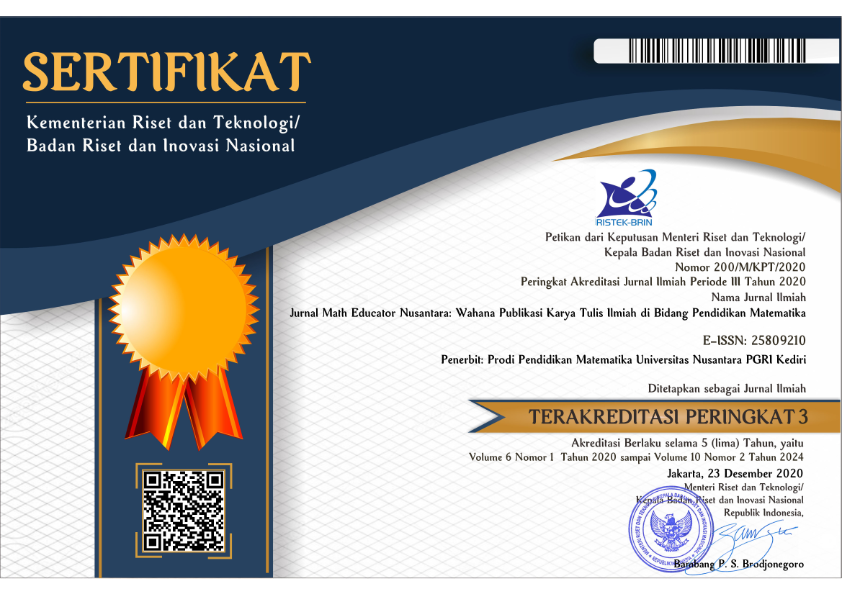The effect of moodle-based learning in learning studios with the TPACK approach on high school students' learning outcomes
DOI:
https://doi.org/10.29407/jmen.v9i1.19313Keywords:
Moodle, Sanggar Belajar, TPACK, Hasil Belajar SiswaAbstract
In the 21st century learning must be integrated with various technological devices in the entire process, this also supports the industrial revolution 4.0 program. The TPACK approach is the answer to these demands, where learning is based on knowledge of teaching materials (content knowledge), how to teach material (pedagogical knowledge), and knowledge of how to use technology (technological knowledge). One example of the application of technology in learning is the Modular Object Oriented Dynamic Learning Environment (moodle), at the research site, namely SMAN 8 Serang City, there is a moodle-based learning studio website. The sample of this study were students of class X at SMAN 8 Kota Serang. The research method used in this study was quantitative pre-experimental design, with a one-group pretest-posttest research design. The results of the study showed that there was an increase in the learning outcomes of students who had studied using the moodle sanggar belajar by 52.3%. The n-gain score obtained was 61.62% which was categorized as "effective enough", which means that learning achieves learning objectives with proven significant mathematics learning outcomes.
References
Amandu, G. M., Muliira, J. K., & Fronda, D. C. (2013). Using Moodle E-learning Platform to Foster Student Self-directed Learning: Experiences with Utilization of the Software in Undergraduate Nursing Courses in a Middle Eastern University. Procedia - Social and Behavioral Sciences, 93, 677–683. https://doi.org/10.1016/j.sbspro.2013.09.260
Boca, G. D. (2021). Factors Influencing Students ’ Behavior and Attitude towards Online Education during COVID-19.
Drew, S. V. (2012). Open up the ceiling on the common core state standards: Preparing s t udents for 21st-century lit eracy-now. Journal of Adolescent and Adult Literacy, 56(4), 321–330. https://doi.org/10.1002/JAAL.00145
Elfira Yuliani, R., & Lestiyani Sari, E. (2021). Pengaruh Penggunaan Aplikasi Geogebra Berbasis Tpack Terhadap Hasil Belajar Matematika Pada Materi Bangun Ruang Di Sma Negeri 19 Palembang the Effect of Using Tpack-Based Geogebra Applications on Mathematics Learning Outcomes on Building Space Materials A. 4(1).
Fitri, S., & Zahari, C. L. (2019). The implementation of blended learning to improve understanding of mathematics. Journal of Physics: Conference Series, 1188(1). https://doi.org/10.1088/1742-6596/1188/1/012109
Hake, R. R. (1999). Analyzing change/gain scores.
Hamalik, O. (2013). Proses Belajar Mengajar. Bumi Aksara.
Ismaeel, D. A., & Al Mulhim, E. N. (2022). E-teaching Internships and TPACK during the Covid-19 Crisis : The Case of Saudi Pre-service Teachers. 15(4), 147–166.
Kemdikbud. (2020). Surat edaran nomor 4 tahun 2020 tentang pelaksanaan kebijakan pendidikan dalam masa darurat penyebaran Coronavirus Disease (Covid-19). Kementerian Pendidikan dan Kebudayaan.
Koehler, M. J., & Mishra, P. (2005). Teachers Learning Technology by Design. Journal of Computing in Teacher Education, 21(3), 94–102. http://reference.kfupm.edu.sa/content/t/e/teachers_learning_technology_by_design_84304.pdf
Mashuri, S. (2019). Media Pembelajaran Matematika. Deepublish. https://books.google.co.id/books?id=jHGNDwAAQBAJ
Moodle. (2018). About Moodle: Philosophy. https://docs.moodle.org/310/en/Philosophy
Muin, A., & Ulfah, R. M. (2012). Dengan Pembelajaran Menggunakan Aplikasi. Phytagoras, 7(1). https://doi.org/10.21831/pg.v7i1.2838
NCTM. (2000). Principles and Standards for School Mathematics. The National Council of Teachers of Mathematics, Inc.
Nichols, M. (2016). A Comparison of Two Online Learning Systems. Journal of Open, Flexible and Distance Education, 20(1), 19–32. http://www.jofdl.nz/index.php/JOFDL/article/view/257
Norhaliza, N., Sari, S. P., & Ariyanti, I. (2022). Analisis Faktor Kesulitan Belajar Matematika Siswa Smp Dalam Mengoptimalkan Pembelajaran Secara Daring. … Pendidikan Matematika, 3(2), 157–164. https://scholar.ummetro.ac.id/index.php/emteka/article/view/1260%0Ahttps://scholar.ummetro.ac.id/index.php/emteka/article/download/1260/1197
Nusa, P. D., Sumarno, & Aziz, A. (2021). Penerapan Pendekatan TPACK untuk Meningkatkan Aktivitas dan Hasil Belajar Peserta Didik Kelas III SD Negeri 1 Kemiri. Jurnal Handayani, 12(1), 91–97.
Park, S. Y., & Donald, K. Mac. (2022). Perceived Technology Integration Knowledge of Higher Education Language Instructors in the F2F Post-2020 Pandemic Era. Journal of Asia TEFL, 19(3), 911–936. https://doi.org/10.18823/asiatefl.2022.19.3.10.911
Rafi, I., Nurjannah, F. F., Fabella, I. R., & Andayani, S. (2020). Peluang dan Tantangan Pengintegrasian Learning Management System (LMS) dalam Pembelajaran Matematika di Indonesia. Jurnal Tadris Matematika, 3(2), 229–248. https://doi.org/10.21274/jtm.2020.3.2.229-248
Ramnarain, U., Annesca, P., & Hsin-kai, W. (2021). Assessing the Technological Pedagogical Content Knowledge of Pre-Service Science Teachers at a South African University. 17(3), 123–136. https://doi.org/10.4018/IJICTE.20210701.oa8
Samsuddin, Y., Rahman, A., & Nadjib, M. (2013). PEMANFAATAN E-LEARNING MOODLE PADA DI SMK NEGERI 5 MAKASSAR Utilization of E-Learning Moodle Outcomes in Mathematics on SMK Negeri 5 Makassar Perkembangan teknologi dan pertumbuhan penggunaan internet di Indonesia beberapa tahun terakhir diduga mempunyai. Jurnal Komunikasi KAREBA, 2(1), 65–72.
Setiana, D. S. (2018). Meningkatkan Kemampuan Menyusun RPP dengan Pendekatan Saintifik Mahasiswa Pendidikan Matematika Universitas Sarjanawiyata Tamansiswa Yogyakarta. Prosiding Seminar Nasional MIPA 2018, 1(1), 120–131. https://proceeding.unnes.ac.id/index.php/SNMIPA/article/view/215/171
Sintawati, M., & Indriani, F. (2019). Pentingnya Technological Pedagogical Content Knowledge (Tpack) Guru di Era Revolusi Industri 4.0. Prosiding Seminar Nasional Pagelaran Pendidikan Dasar Nasional (Ppdn) 2019, 1(1), 417–422. http://seminar.uad.ac.id/index.php/ppdn/article/view/1355
Slavin, R. E. (2003). A reader's guide to scientifically based research. Educational leadership, 60(5), 12-16.
Umek, L., Aristovnik, A., Tomaževič, N., & Keržič, D. (2015). Analysis of selected aspects of students performance and satisfaction in a moodle-based e-learning system environment. Eurasia Journal of Mathematics, Science and Technology Education, 11(6), 1495–1505. https://doi.org/10.12973/eurasia.2015.1408a
Downloads
Published
Issue
Section
License
Authors who publish with this journal agree to the following terms:
- Copyright on any article is retained by the author(s).
- The author grants the journal, the right of first publication with the work simultaneously licensed under a Creative Commons Attribution License that allows others to share the work with an acknowledgment of the work’s authorship and initial publication in this journal.
- Authors are able to enter into separate, additional contractual arrangements for the non-exclusive distribution of the journal’s published version of the work (e.g., post it to an institutional repository or publish it in a book), with an acknowledgment of its initial publication in this journal.
- Authors are permitted and encouraged to post their work online (e.g., in institutional repositories or on their website) prior to and during the submission process, as it can lead to productive exchanges, as well as earlier and greater citation of published work.
- The article and any associated published material is distributed under the Creative Commons Attribution-ShareAlike 4.0 International License















